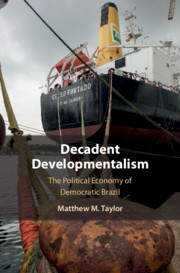Book contents
- Decadent Developmentalism
- Decadent Developmentalism
- Copyright page
- Dedication
- Contents
- Figures
- Tables
- Acknowledgments
- Abbreviations
- 1 Introduction
- Part I Complementarities in the Economic Sphere
- Part II Economic, Legal, and Political Control of the Developmental State
- 5 Coalitional Presidentialism and Defensive Parochialism
- 6 Rents, Control, and Reciprocity
- 7 The Autonomous Bureaucracy and Incremental Change
- 8 Conclusion
- Notes
- References
- Index
5 - Coalitional Presidentialism and Defensive Parochialism
from Part II - Economic, Legal, and Political Control of the Developmental State
Published online by Cambridge University Press: 04 November 2020
- Decadent Developmentalism
- Decadent Developmentalism
- Copyright page
- Dedication
- Contents
- Figures
- Tables
- Acknowledgments
- Abbreviations
- 1 Introduction
- Part I Complementarities in the Economic Sphere
- Part II Economic, Legal, and Political Control of the Developmental State
- 5 Coalitional Presidentialism and Defensive Parochialism
- 6 Rents, Control, and Reciprocity
- 7 The Autonomous Bureaucracy and Incremental Change
- 8 Conclusion
- Notes
- References
- Index
Summary
Incentives within the political system during the 1985–2018 period made exceedingly difficult a shift toward either a more effective developmentalism or a more liberal market economy. Among the political institutions that drove this equilibrium were: 1) an electoral system that fragmented political party representation; 2) coalitional presidentialism, whereby a strong president sought to overcome fragmentation by providing incentives to coalition partners. Many of the 3) president’s tools of coalition formation were derived from the developmental state apparatus, including appointments and fiscally opaque instruments. The fragmentation of party life, alongside the many veto players engendered by coalitional presidential system, enabled 4) the emergence of both pluralist and corporatist forms of interest representation. The complementarities between these four political institutions had concrete effects: a resolute political system, in which change was slow and incremental, marked by long-term reciprocal relations between private firms and public actors, defensive parochialism, weak checks and balances, and weak controls on the developmental state apparatus.
Keywords
- Type
- Chapter
- Information
- Decadent DevelopmentalismThe Political Economy of Democratic Brazil, pp. 121 - 156Publisher: Cambridge University PressPrint publication year: 2020

